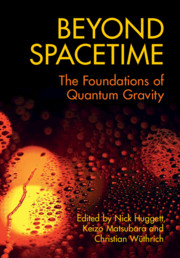Book contents
- Frontmatter
- Contents
- List of Contributors
- 1 Introduction
- Part I Spacetime Emergence
- Part II Time in Quantum Theories of Gravity
- Part III Issues of Interpretation
- 10 Why Black Hole Information Loss Is Paradoxical
- 11 Chronic Incompleteness, Final Theory Claims, and the Lack of Free Parameters in String Theory
- 12 Spacetime and Physical Equivalence
- 13 On the Empirical Consequences of the AdS/CFT Duality
- 14 Extending Lewisian Modal Metaphysics from a Specific Quantum Gravity Perspective
- 15 What Can (Mathematical) Categories Tell Us about Spacetime?
- Index
10 - Why Black Hole Information Loss Is Paradoxical
from Part III - Issues of Interpretation
Published online by Cambridge University Press: 24 April 2020
- Frontmatter
- Contents
- List of Contributors
- 1 Introduction
- Part I Spacetime Emergence
- Part II Time in Quantum Theories of Gravity
- Part III Issues of Interpretation
- 10 Why Black Hole Information Loss Is Paradoxical
- 11 Chronic Incompleteness, Final Theory Claims, and the Lack of Free Parameters in String Theory
- 12 Spacetime and Physical Equivalence
- 13 On the Empirical Consequences of the AdS/CFT Duality
- 14 Extending Lewisian Modal Metaphysics from a Specific Quantum Gravity Perspective
- 15 What Can (Mathematical) Categories Tell Us about Spacetime?
- Index
Summary
I distinguish between two versions of the black hole information-loss paradox. The first arises from apparent failure of unitarity on the spacetime of a completely evaporating black hole, which appears to be non-globally hyperbolic; this is the most commonly discussed version of the paradox in the foundational and semipopular literature, and the case for calling it `paradoxical' is less than compelling. But the second arises from a clash between a fully statistical-mechanical interpretation of black hole evaporation and the quantum-field-theoretic description used in derivations of the Hawking effect. This version of the paradox arises long before a black hole completely evaporates, seems to be the version that has played a central role in quantum gravity, and is genuinely paradoxical. After explicating the paradox, I discuss the implications of more recent work on AdS/CFT duality and on the `Firewall paradox', and conclude that the paradox is if anything now sharper. The article is written at a (relatively) introductory level and does not assume advanced knowledge of quantum gravity.
Keywords
- Type
- Chapter
- Information
- Beyond SpacetimeThe Foundations of Quantum Gravity, pp. 209 - 236Publisher: Cambridge University PressPrint publication year: 2020
- 5
- Cited by



